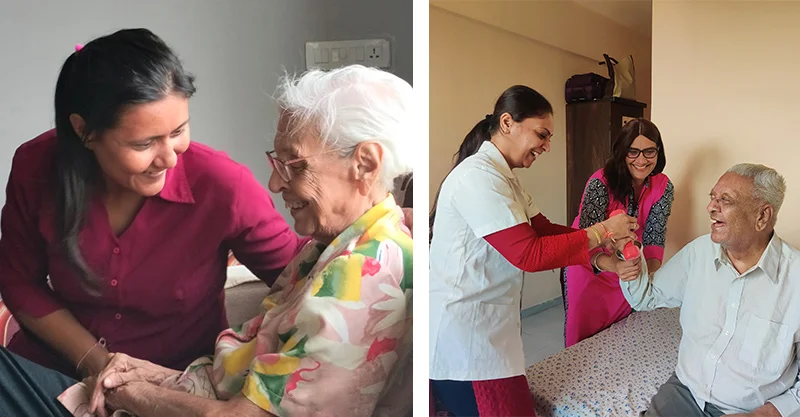In the golden years of life, maintaining mental well-being becomes increasingly crucial for seniors. However, aging often brings unique challenges to mental health, including depression, anxiety, loneliness, and cognitive decline. In navigating these challenges, caregivers play a pivotal role in providing the necessary support and companionship to ensure the mental well-being of seniors.
Understanding the Challenges
As individuals age, they may face various mental health challenges that can significantly impact their quality of life. Depression is one of the most common mental health issues among seniors, with factors such as chronic illness, loss of loved ones, and social isolation contributing to its prevalence. Additionally, anxiety disorders, cognitive decline, and feelings of loneliness are also prevalent among older adults. These challenges can have profound effects on seniors’ overall well-being and require sensitive and effective support systems.
The Importance of Caregiver Support
Caregivers serve as a lifeline for seniors, offering essential physical, emotional, and social support. Their role extends beyond just providing assistance with daily tasks; caregivers often serve as companions and advocates for the seniors under their care. Studies have shown that strong caregiver support can significantly improve seniors’ mental health outcomes, promoting feelings of security, belonging, and emotional well-being.
Building Strong Caregiver-Senior Relationships
Building strong relationships between caregivers and seniors is essential for fostering trust, communication, and mutual respect. Caregivers must take the time to understand each senior’s individual needs, preferences, and personal history. By establishing open lines of communication and demonstrating empathy and compassion, caregivers can create an environment where seniors feel valued and understood.
Practical Caregiving Techniques
Caregivers can support seniors’ mental well-being by incorporating practical techniques into their daily caregiving routines. Encouraging social engagement through activities such as group outings, family visits, and community events can help combat feelings of loneliness and isolation. Physical activity is also crucial for seniors’ mental health, as it promotes overall well-being and can alleviate symptoms of depression and anxiety. Additionally, cognitive stimulation, such as puzzles, games, and memory exercises, can help seniors maintain mental acuity and delay cognitive decline.
You may like to read this: Caring for the Elderly: 6 Things to Remember
Addressing Caregiver Burnout
While caregiving can be deeply rewarding, it can also be physically and emotionally taxing. Caregivers must prioritize self-care and recognize the signs of burnout, including feelings of exhaustion, frustration, and resentment. Taking regular breaks, seeking support from friends and family members, and practicing stress-management techniques are essential for preventing caregiver burnout. Additionally, accessing respite care services can provide caregivers with much-needed time off to recharge and rejuvenate.
Seeking Professional Support
In some cases, caregivers may find themselves ill-equipped to address the complex mental health needs of the seniors under their care. In such instances, seeking professional support is crucial. Mental health professionals, such as therapists, counselors, and geriatric psychiatrists, can offer specialized care and interventions tailored to seniors’ unique needs. Caregivers should not hesitate to reach out for help when needed and advocate for the mental health services their loved ones require.
Promoting a Positive Caregiving Experience
Despite the challenges they may face, caregivers play an essential role in enriching the lives of the seniors they care for. Celebrating small victories, maintaining a sense of humor, and fostering meaningful connections with seniors can make the caregiving experience more fulfilling and rewarding. By focusing on the positive aspects of caregiving and cherishing the moments shared with their loved ones, caregivers can find purpose and joy in their role.
PapayaCare – Why is it the Best Elderly Caregiver? 10 Reasons to Consider
- Comprehensive Services: PapayaCare offers a wide range of services tailored to meet the unique needs of seniors, including personal care, medication management, companionship, and specialized care for individuals with dementia or Alzheimer’s disease.
- Qualified Caregivers: All caregivers employed by PapayaCare undergo rigorous training and background checks to ensure they possess the skills, compassion, and professionalism necessary to provide high-quality care to seniors.
- Personalized Care Plans: PapayaCare works closely with seniors and their families to develop personalized care plans that address their specific needs, preferences, and goals. This customized strategy guarantees that elderly individuals receive the necessary care and support for their optimal well-being.
- Flexible Scheduling: Whether seniors require round-the-clock care or just a few hours of assistance each week, PapayaCare offers flexible scheduling options to accommodate their unique preferences and circumstances.
- Emphasis on Quality of Life: PapayaCare prioritizes the well-being and quality of life of seniors, focusing not only on meeting their physical needs but also on promoting social engagement, mental stimulation, and emotional support.
- Transparent Communication: PapayaCare maintains open lines of communication with seniors and their families, providing regular updates on their loved one’s care and addressing any questions or concerns promptly and compassionately.
- Cost-Effective Solutions: PapayaCare understands the financial challenges often associated with caregiving and strives to provide cost-effective solutions that maximize value without compromising on quality.
- Continuity of Care: With PapayaCare, seniors benefit from continuity of care, meaning they receive consistent support from the same caregivers whenever possible. This continuity fosters trust, familiarity, and a sense of security for seniors and their families.
- Holistic Approach: PapayaCare takes a holistic approach to elderly caregiving, recognizing that seniors’ well-being is influenced by various factors, including physical health, mental health, social connections, and emotional support. Their comprehensive approach addresses all aspects of seniors’ lives to promote overall wellness and happiness.
- Client Satisfaction: With a track record of satisfied clients and positive testimonials, PapayaCare has earned a reputation for excellence in elderly caregiving. Families can trust that their loved ones will receive the highest standard of care and support from the dedicated team at PapayaCare.
Conclusion
In conclusion, caregivers are instrumental in supporting the mental well-being of seniors. By providing compassionate care, fostering strong relationships, and implementing practical techniques, caregivers can help seniors navigate the challenges of aging with dignity and grace. It is essential for caregivers to prioritize their own well-being and seek support when needed to ensure they can continue to provide the best possible care for their loved ones. Together, caregivers and seniors can work towards maintaining optimal mental health and enhancing overall quality of life in the later years.
PapayaCare stands out as a top choice for elderly caregiving due to its comprehensive services, qualified caregivers, personalized care plans, flexibility, emphasis on quality of life, transparent communication, cost-effective solutions, continuity of care, holistic approach, and track record of client satisfaction. Families can feel confident entrusting the care of their loved ones to PapayaCare, knowing they will receive the compassionate, professional support they deserve.
















